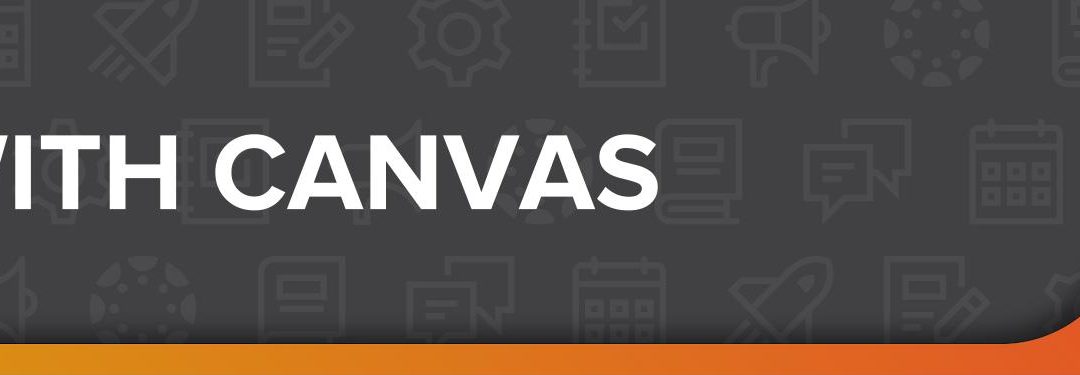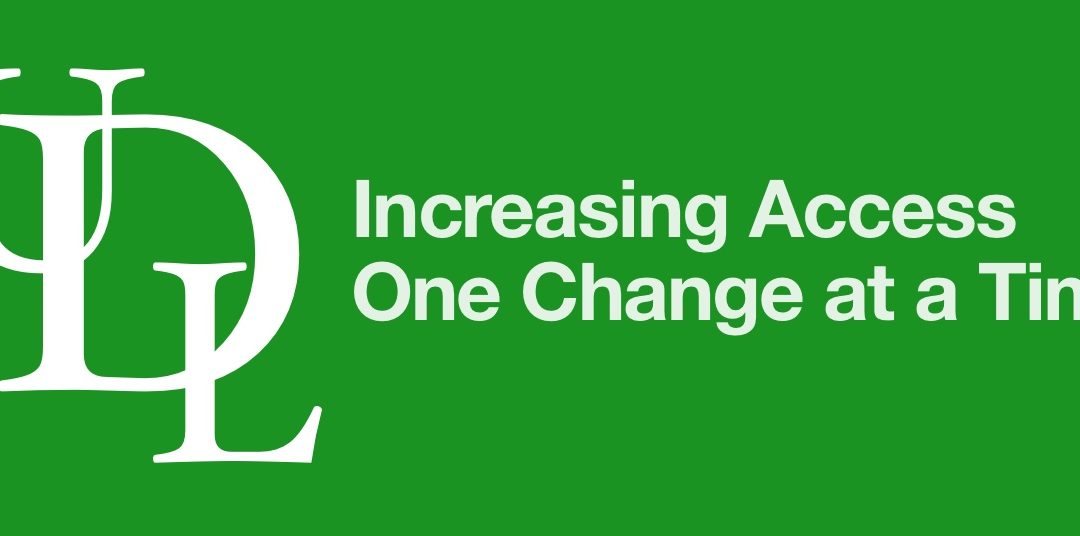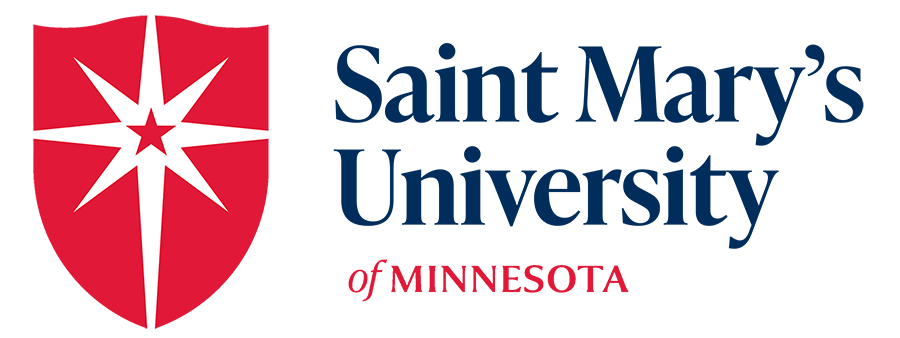News

Canvas Access, Migration, and Trainings are here!
The LMS Task Force has lots of news to share with you on the progress of the Canvas implementation. While we have been piloting our first canvas courses this fall (in Spanish, no less) we have also added to our team. We are grateful to have our new Director of Instructional Technology for the Twin Cities, Abram (Abe) Hedtke, join our team. He has even created a short video to summarize the big updates:
Access to Canvas
The biggest news is that you now have access to Canvas! That’s right. You have been hearing about it for a long time, but you can finally try it out by going to https://smumn.instructure.edu. You’ll log in with your Saint Mary’s username and password (just like Blackboard now). If your regular username doesn’t seem to work, try using all CAPS. Once you are logged in, you will see that you have access to a self-paced training course called “Growing with Canvas” as well as a Sandbox course where you can try out anything and everything in the system. Our many thanks to Tianna Johnson and Lincoln Scully along with the IT team have done a lot of work to make this possible.
Migration Process
Second, as announced in a previous Cardinal Update, the course migration process is underway. Many SGPP Blackboard courses are being migrated right now to be ready for offering in Spring 1 and Spring 2 using the K-16 migration solution. LMS Task Force members Greta Poser and Abram Hedtke are working with the program leaders of the first programs identified for spring migration. The rest of the SGPP and College courses will be migrated during the spring so that everyone has plenty of time to tweak their course shells before their courses are offered in the Summer and Fall. This timeline will allow instructors to experiment with Canvas during the whole spring term(s) to learn the new LMS and get your courses just how you want them. For our SGPP online programs currently offered in the Engage platform, the timeline is a bit different but is also underway. With our Wiley partner leading this migration effort, the migration will include moving the courses into Canvas as well as a post migration professional clean up to ensure they are ready to teach. Our LMS Task Force members are working with respective program leaders on this migration effort as well.
Canvas Training
Finally, Canvas training is happening now. Once you log in to Canvas, you’ll see our first option for training: a self-paced course in Canvas called “Growing with Canvas”. For some of you, this is all that you will need to figure out the new LMS. But we are also going to give you many more opportunities, starting with official Canvas trainers later this month. Here is the schedule, which you can also find on CELT’s Calendar or the new Canvas Updates page:
- September 30, 2-5pm: Canvas Basics Part 1: Canvas Orientation, Communicating with Canvas, and Assignments
- October 2, 11-2: Canvas Basics Part 2: Quizzes and Tests, Grading, and Modules
- October 15, 10-5pm: Free Canvas Conference: CanvasCon, for those who want to dive deep into all that Canvas can do
The first two workshops will be recorded for any who cannot attend and the recordings will be posted on the CELT site. After these initial sessions, we will hold internal training on these and similar topics, including sessions on polishing up your migrated courses and special sessions to learn how to do various Blackboard tasks in Canvas.
We thank you all for your partnership throughout the transition and look forward to exploring Canvas together with you. For more detailed updates between Cardinal Updates, and training schedules, you can visit https://celt.smumn.edu/canvas. You can also email lms@smumn.edu with any questions.

Why was I Invited to Growing With Canvas?
Did you receive a mysterious email saying you were invited to the “Growing with Canvas” Teacher Training course? Or did you go to https://smumn.instructure.com, enter your username and password and see this “course card” on your dashboard?

Don’t fret — it is not spam or phishing. In fact, for many of you this will be your first opportunity to interact with Canvas, Saint Mary’s new Learning Management System. If you follow the link and log into Canvas (you may need to use all CAPS for your username), you should see that you are enrolled in Growing with Canvas — a self-paced course that will allow you to learn to use Canvas as an instructor on your own time.

Growing with Canvas guides you through all of the standard Canvas functions via its course modules. And you will be able to practice what you learn in your Canvas sandbox course (also available in your courses) without the fear that anyone will be using your course while you experiment.

Growing with Canvas is just the first training opportunity we will offer with Canvas. Check out the Calendar on the main Canvas page to see when we will offer live sessions with Canvas trainers and trainings run by Saint Mary’s staff as well.

UDL Spotlight on Google Read & Write and Zoom
CELT often partners with Access Services to promote some tips and technologies for increasing access to all students in our courses. All of these suggestions come from the idea of Universal Design for Learning (UDL): designing or improving our courses so they can reach as many learners as possible. (And if you would like to be part of that movement, the UDL PLC meets virtually each Friday at 9am.)
This month, we want to promote Google Read and Write, which can make your documents more accessible by:
- allowing text-to-speech and speech-to-text conversions for students
- turning copied pages into editable and screen-reader friendly text
- translation between languages
- and many other features that help students take notes, study, and do research on digital resources
We have a university-wide license for it, and an excellent tutorial video here. Please share it with your students and fellow faculty!
Also, the following resources will help make Zoom classes more accessible:

Recording Now Available: Fall Faculty Conference with Dr. Joshua Eyler
If you were not able to attend the Fall Faculty Conference on September 12, or if you did attend and wanted to review the recording, it is now available here on the CELT website. You can find it by clicking into this post or on the recordings section of our site.
The recording is 4 hours, but it is a Panopto recording, so you can watch it at any speed. And the slides are displayed in addition to the people speaking. You can also see many of the references from the Zoom chat during the conference by clicking on “Notes” in the lower left-hand corner.
Here is a breakdown if you are looking for something specific:
- [00:00] Conference Welcome and Information
- [10:20] Beginning of Workshop on Failure and Learning
- [1:50:30] Question and Answer on Failure and Learning Workshop
- [2:19:19] Beginning of Resilient Pedagogy Workshop
- [3:16:00] Question and Answer on Resilient Pedagogy
- [3:35:00] Presentation of Brother Julius Winkler Award
- [3:48:00] Mini-Session on Top 5 Teaching Tips from Recent Pedagogical Research

2020 Fall Faculty Conference Featuring Dr. Joshua Eyler

2020 Fall Faculty Conference Featuring Dr. Joshua Eyler
Fall Faculty Conference Full Schedule
Fall Faculty Conference Flyer
Register for the Conference
CELT is proud to announce that registration is open for the 2020 Fall Faculty Conference Friday, September 11 (5-6:30pm) and Saturday, September 12 (9-1:30pm). This event is the culmination of the six month Teaching and Learning Series on the Science of Learning centered around Dr. Joshua Eyler’s new book How Humans Learn.
We have been fortunate, even in the time of COVID-19, to have spent the last six months guided by some of Saint Mary’s best educators (Tracy Lysne, Sarah Haugen, Melanie Torberg, and Sue Hines) in workshops and book clubs around the topics Dr. Eyler covers in his book. And in the conference, Dr. Eyler will be with us over Zoom to discuss the book further and present two workshops on Saturday, September 12:
- Why Failure is Essential for Student Learning
- Resilient Pedagogy: Making Our Courses More Flexible, Adaptable, and Resistant to Disruption
Saturday’s schedule will also include the presentation of the Brother Julius Winkler award for Faculty Excellence at the SGPP.
We are unable to gather in person this year for the traditional dinner and keynote on Friday night, but we know that the dinner was a popular event. So in the spirit of fun, experimentation, and (maybe) failure that is the hallmark of good learning, we are going to have a virtual “game night” on Friday from 5-6:30pm. You don’t have to attend both Friday and Saturday, but we think we’ve got a good program lined up!
We have a summary flyer for the event, a complete schedule of events on Friday and Saturday and we’d love for you to register at the link below. Those who are registered will receive Zoom links before th event.
Josh Eyler is Director of Faculty Development and Director of the Thinkforward Quality Enhancement Plan at the University of Mississippi, where he is also on the faculty in the Department of Writing and Rhetoric. He previously worked on teaching and learning initiatives at Columbus State University, George Mason University, and Rice University. His research interests include the biological basis of learning, evidence-based pedagogy, and disability studies, and he is the author of How Humans Learn: The Science and Stories behind Effective College Teaching (WVU, 2018).
Josh is a frequent speaker at colleges and universities across the country, and he often consults with centers for teaching and learning on a range of issues related to programming and research. You can contact Josh at jreyler@olemiss.edu or at @joshua_r_eyler on Twitter.
If you have any questions, just email CELT@smumn.edu.

New Self-Paced Course on Designing for Accessibility Online
As our Convocation keynote speaker, Dr. Ramón Pastrano reminded us, too often we mistake a failure of our systems to meet students where they are for a deficiency in students themselves. That should make designing accessible courses a vital part of faculty work. But where to start?
There is a great resource in Wiley’s new self-paced course for program administrators and faculty entitled, “Designing for Accessibility in Online Education”. By the conclusion of the course, participants should be able to:
- Explain the laws and standards that relate to accessible design
- Identify ways that specific disabilities may affect the user experience in the online environment
- Describe the application of Universal Design for Learning in an online course environment
- Review a variety of common file types for accessibility-related concerns and then correct them appropriately
The course is 3-4 hours in length and entirely self-paced. Faculty can enroll themselves whenever they like through Wiley’s Academic Engagement Portal using their .edu email address. You can get more details about it in this flyer for the course.

Exploring podcasts as assignments
Need flexible assignments that help students to demonstrate learning? A podcast assignment might be worth exploring. Podcasts are a very popular tool for storytelling. They are easy to consume and it does not take much to get started with creating them.
Like with most academic papers and presentations, students should start by creating an outline.
- Introduction of themselves and the topic
- Points they want to discuss about the topic
- Main takeaways or conclusion
Recordings can be created with mobile phones and edited with Audacity or GarageBand (both are free).
Utilizing royalty free music and sound effects can also include a short lesson on intellectual capital.
The final products can be uploaded to a class Google Drive folder for gathering and sharing. Posting the shared folder URL to the LMS course site will streamline access for everyone.
Podcasting for Educators Resource Links:
- The Nuts and Bolts of Creating Podcasts
- Teaching Students How to Produce Their Own Podcasts
- 10 Podcasting Projects Teachers Should Try in the Classroom (K12 oriented but the list is thought provoking)
- Podcasting Resources Page from Vanderbilt University.
- Teaching Podcasting: A Curriculum Guide for Educators (NPR)
- Building a Better Podcast Assignment
“microphone” by Ben McLeod is licensed under CC BY-NC-SA 2.0
